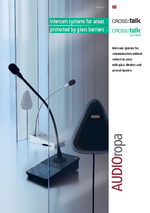»cross:talk comfort« and »cross:talk«
The systems »cross:talk comfort« and »cross:talk« are functionally identical. »cross:talk comfort« differs primarily in the design of the operating elements and in the extended features.
The delivery of the »cross:talk« systems includes in each case:
- an internal microphone unit with control functions,
- a gooseneck microphone which displays if it is active or not,
- an external microphone unit for adhesive mounting on smooth surfaces
- a special cable with interfaces for:
- connection of the two microphone units
- the supply of power for the components
- output of the microphone signal for connection to external inductive loop systems
Both intercoms are extremely easy to operate and have convenient automatic functions. An internal DSP signal processing adjusts the volume accordingly to the respective speaking distance. Both systems detect ambient noise and reduce its influence on speech intelligibility.
Expansion options
In addition to the power supply and the connection for the external microphone unit, the internal microphone unit also provides an audio output via a central connection cable. This allows the connection to an external inductive loop system, which transmits the speech signals via magnetic fields to hearing aids or cochlear implant systems (CI). This way, users of hearing aids and CI systems can also be included in communication, free of barriers. 1)
»cross:talk« – potential areas of application
The system is designed for use in areas where partition walls are installed and a high quality of speech intelligibility between the conversation partners plays a central role. These include bank and post office counter areas, hotel receptions as well as medical and cultural facilities, information desks, counselling and sales counters in the transport sector or contact and visiting rooms in correctional facilities.
1) Prerequisite is an activated T-coil in the respective individual hearing systems or special receiver systems / hearing components for inductive audio signals.
Download broschure




